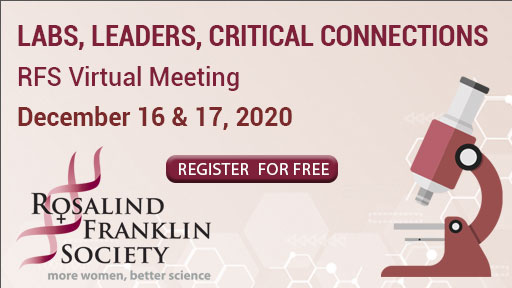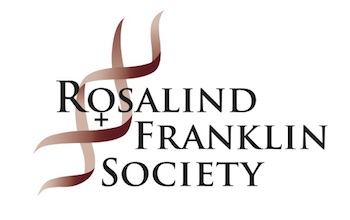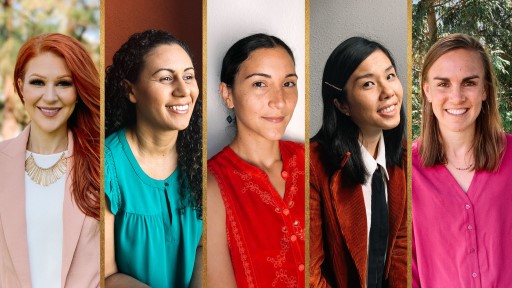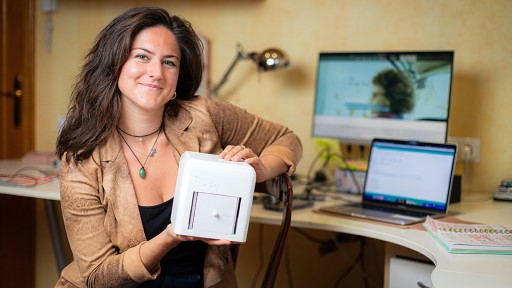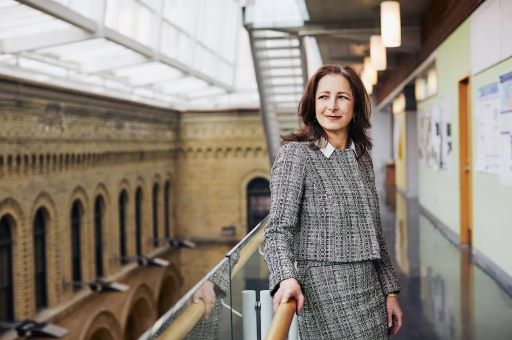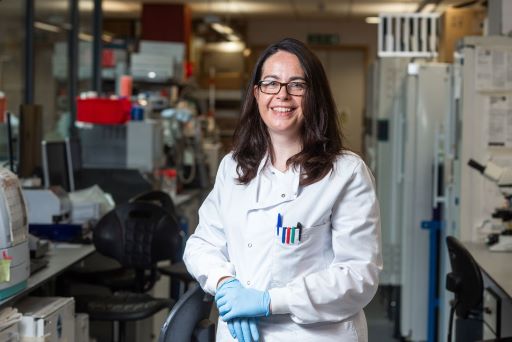The ‘Prussian Turk’ couple’s company BioNTech developed the breakthrough Covid vaccine with Pfizer: Meet Uğur Şahin, CEO of BioNTech, and Özlem Türeci, BioNTech’s chief medical officer, who founded BioNTech in 2008 with the Austrian oncologist Christoph Huber. Both scientists are the children of Turkish migrants who moved to Germany in the late 1960s. They are the “dream team” scientist couple who came up with a big idea that could protect humanity from a virus that has killed more than a million people, writes Philip Oltermann in an article for The Guardian.
The 1st Black female brigade commander at Naval Academy: 'I have the heart to do it' Midshipman 1st Class Sydney Barber of Lake Forest, Ill., is slated to be the U.S. Naval Academy's first African American female brigade commander. It's the highest student leadership position at the academy.
Cathy Foley appointed Australia's next chief scientist. The physicist, who has been with CSIRO for 36 years, is the second woman appointed to the role. Foley, whose work has focused on the physics behind superconductors, is an outspoken advocate of attracting more women to STEM (science, technology, engineering and mathematics).
Medical statistician wins prestigious award to celebrate women in STEM. Congratulations to Rhian Daniel from Cardiff University who has been chosen to receive a prestigious award celebrating the achievements of women working in STEM. The Suffrage Science Awards is in its third year and is curated by the MRC London Institute of Medical Sciences. Professor Dame Amanda Fisher, institute director, said the purpose of the awards was to “celebrate women scientists, their scientific achievements and ability to inspire others”.
In the UK, the All-Party Parliamentary Group (APPG) on Diversity and Inclusion in Science, Technology, Engineering and Maths (STEM) launched its new inquiry into Equity in the UK STEM workforce. The inquiry will examine how the Government and organizations employing STEM workers are helping to create a diverse and inclusive environment.
Opportunities
The Vilcek Foundation and The Arnold P. Gold Foundation will award a $10,000 prize to an outstanding immigrant professional in public health. Learn more and nominate a foreign-born healthcare worker today! Nominators may submit any foreign-born person living and working in the United States whose work in healthcare, medicine, or public health advocacy has demonstrated extraordinary humanism.
Now open for submissions: Apply today for the 2021 Science & PINS Prize for Neuromodulation. The Science & PINS Prize for Neuromodulation is awarded for innovative research that modulates neural activity through physical (electrical, magnetic, optical) stimulation of targeted sites in the nervous system with implications for translational medicine. Established in 2016, the prize is awarded annually for outstanding research as described in a 1,500 word essay based on research performed in the past three years.
Make a difference. Join the NIH Office of the Director, Scientific Workforce Diversity Office! This position will support efforts related to the COVID-19 public health emergency. As a Supervisory Social Science Analyst (COVID-19), your duties will include planning, developing, and implementing targeted workforce diversity research programs.
P&G’s Royal Oils and Gold Series announce ongoing commitment to support Black Women in STEM. Together with CVS this fall, P&G will award $200,000 in scholarships to Black women pursuing a degree in STEM subjects at historically Black colleges and universities (HBCUs) and UNCF member schools, facilitated through long-time higher education partner UNCF (United Negro College Fund).
Women in STEM
This scientist buoys a small firm’s quest to make a top-notch COVID-19 vaccine. Nita Patel, a senior director in the vaccine development department at Novavax, often works 18-hour days in the lab, and says, “People ask me if I’m tired, I don’t feel tired.” Watch this video to learn how she has supported the development of a potential vaccine in just 10 months.
Teresa Lambe is working with AstraZeneca to give the world a shot against the SARS-CoV-2 coronavirus. “I’m fascinated with T cells as well as antibodies. T cells don’t prevent infections, but they do seek out and destroy infected cells. If we could develop a vaccine that triggers both T cells and antibodies, we’d have a double whammy that could provide strong protection against SARS-CoV-2,” she wrote in an article for Nature.
Teresa ‘Tess’ Lambe is a vaccine investigator at the University of Oxford’s Jenner Institute, UK.
Radioactive: new Marie Curie biopic inspires, but resonates uneasily for women in science Radioactive, Jack Thorne’s screenplay adaptation of Lauren Redniss’ graphic novel, attempts to portray the drive and dedication Curie must have possessed to achieve her career success. “Radioactive reinforces what some women in male dominated STEM fields might still encounter today: women can be perceived as competent or likeable, but not both,” according to Merryn McKinnon, Senior lecturer at the Australian National University.
How a communist physics teacher flattened the COVID-19 curve in southern India. In India, a former teacher who wasn't trained as a scientist devised the strategy to keep COVID-19 in check in the state of Kerala, with a mortality rate among the lowest in the world. “Until we get a vaccine, all of us will have to sacrifice some pleasures in our lives,” said K. K. Shailaja, health minister of India’s Kerala state, in an article for Science Magazine.
Undergraduate researcher Natalie Lo takes on cancer biology. Natalie Lo is one of 4 Stony Brook undergraduates to receive the Sass Foundation-Arena Scholars award recognizing research potential in URECA Summer applicants working in the field of cancer biology.
Ignite her curiosity: 60 children's books to inspire science-loving Mighty Girls. One great way to encourage a child's interest in science is by showing them role models of kids — particularly girls — in STEM fields. “In fictional stories, they can see faces that match their own: kids who are turning their ingenious minds to investigating questions and solving problems using the scientific method,” writes Katherine Handcock.
“Opening up about my invisible health condition:” Anne Charmantier reveals how she has learnt to be vulnerable and to share her experience of her chronic health problem with research colleagues and collaborators. “I now feel more secure and empowered, and I realize that my chronic condition has, in fact, been an important asset in my life, both personally and professionally. My condition has spurred me to accomplish as much as I can. It has fuelled my will and my enthusiasm to do research, and increased my empathy and kindness towards colleagues and students who are facing challenging times,” writes Charmantier in an article for Nature.
AAAS IF/THEN ambassadors inspire girls to pursue STEM. AAAS IF/THEN Ambassadors are women innovators who serve as role models and inspire girls to pursue STEM careers. This month, the ambassadors received “reverse mentoring,” learning from middle and high school girls how to engage their audience on TikTok.
Searching symbols for the rules of change. Bryna Kra, a mathematician at Northwestern University, uses a modeling method called symbolic dynamics to hunt for patterns in complex systems like planets arcing through space or billiard balls bouncing around a table.
Ideas
New York University physician and epidemiologist Céline Gounder has straddled the worlds of medicine, government, and the media. She is now one of 13 people President-elect Joe Biden has named to a high-profile task force to help steer his response to the coronavirus pandemic. “Scientists and doctors and public health experts need to be front and center at press conferences, at daily briefings. Not political officials. Because by definition, once you have a political official communicating this it becomes politicized. It really doesn’t matter whether it’s a Republican or a Democrat, it is politicized,” said Gounder in an interview for Science Magazine.
What is it like to be a black woman scientist? Do they feel invincible, less than their colleagues or like they belong? Are they in a constant battle to prove themselves, or do they feel free to focus on the thing they love – science? How do they deal with the stereotypes associated with being female, as well as those associated with being black?
In a conversation with Kirk Johnson, Sant Director of the National Museum of Natural History, Rita Colwell will talk about her new book, A Lab of One's Own: One Woman's Personal Journey Through Sexism in Science and reflect on her six-decade journey in science, from her start as a graduate student at Purdue University through leading thousands of scientists investigating the impacts of the Deepwater Horizon oil spill. Register for the event on December 2, 2020.
Join this event for an evening of stories from women leading field research in partnership with the IF/THEN Ambassadors! Hosted by Story Collider’s Maryam Zaringhalam and Emma Young. Wednesday, December 9, 2020.
Four years after science took a hit, there’s hope. 500 Women Scientists is a grassroots organization started by four women who met in graduate school at CU Boulder and who maintained friendships and collaborations after jobs and life took them away from Boulder. Since 2016, they have grown to thousands of members and almost 500 pods (local chapters) worldwide. They edited thousands of Wikipedia pages to make sure women’s contributions to science are acknowledged, created a platform to abolish manels and make it easy to find a woman scientist with expertise in any discipline, grew a network of thousands of women scientists and supporters who are working on making science open, inclusive and accessible, and launched a fellowship for women of color.
Marianna Limas, Social Media Manager
Nilda Rivera, Partnership and Events Manager
